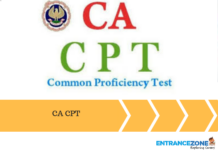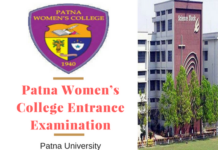The Central Board of Secondary Education (CBSE) has announced that it will be conducting board exams twice a year from 2024. This is a major change from the current system, where exams are only conducted once a year. The decision to conduct board exams twice a year has been made in line with the recommendations of the National Education Policy (NEP) 2020.
Admission Open 2023
- Top University & Colleges Official Links, Application & Scholarship Forms.
Key Points on New CBSE Board Exam Format
Contains
The Ministry of Education (MoE) has introduced significant changes to the CBSE board exams, in line with the National Education Policy (NEP) 2020. Here are the key points regarding the new CBSE board exam format:
- Twice-a-Year Exams: CBSE board exams will now take place twice a year. This move aims to alleviate the pressure on students by providing them with two opportunities to appear for exams annually.
- Holistic Development: The revised exams will focus on holistic development, emphasizing critical and creative thinking skills. They will be designed to be more application-based.
- No Term-Wise Exams: The new format does not entail term-wise exams. Instead, two separate board exams will be conducted during the academic year.
- Retaining Highest Scores: Students will have the benefit of retaining the highest scores obtained in the two exams. This encourages students to strive for improvement.
These changes reflect the commitment of the MoE and CBSE to provide a more flexible and student-friendly education system, fostering a holistic approach to learning and assessment.
Subscribe to Get Updated Information about The Pros and Cons of CBSE Board Exams Twice a Year - Admissions
CBSE Board Exams 2024: Key Features of the New Curriculum Framework
The National Curriculum Framework (NCF) 2023 is set to bring significant changes to CBSE board exams and school curricula. Here are some key features and objectives of the NCF 2023:
- Twice-a-Year Board Exams: CBSE board exams will now be conducted twice a year. This change aims to reduce the pressure on students and provide them with opportunities to improve their scores.
- Flexibility in Stream Choice: Students in classes 11th and 12th will have more flexibility in choosing their streams, allowing them to align their education with their interests and career goals.
- Mandatory Two Languages: The NCF mandates the study of two languages in class 11 and class 12, with at least one language being an Indian language. This promotes linguistic diversity and proficiency.
- New Textbooks: The curriculum framework envisions the development of new textbooks for the 2024 academic session. These textbooks will likely reflect the changes in the curriculum and assessment patterns.
These changes are aligned with the vision of the National Education Policy (NEP) 2020 and aim to enhance the quality of education in India while providing students with more choices and opportunities for holistic development.
Reasons for Conducting Board Exams Twice a Year
The CBSE has cited the following reasons for conducting board exams twice a year:
- To reduce the pressure on students and teachers.
- To provide students with more opportunities to improve their scores.
- To make the assessment process more continuous and comprehensive.
- To align the assessment with the new curriculum framework.
How the Exams Will be Conducted
The board exams will be conducted in two terms, Term 1 and Term 2. Each term will have a duration of three months. The exams will be held in the months of April and October.
Students will be required to appear for all the subjects in both terms. However, they will only be promoted to the next class based on their performance in Term 2. The marks of Term 1 will be kept for record purposes only.
Benefits of Conducting Board Exams Twice a Year
There are several benefits to conducting board exams twice a year. These include:
- Reduced pressure on students: Students will have the opportunity to spread out their studies over a longer period of time. This will help to reduce the pressure they feel during the exam season.
- More opportunities to improve scores: Students who do not perform well in Term 1 will have a chance to improve their scores in Term 2. This will give them a better chance of getting into their desired colleges and universities.
- More comprehensive assessment: The continuous assessment process will help to provide a more comprehensive assessment of students’ learning. This will help teachers to identify and address any learning gaps early on.
- Aligned with new curriculum framework: The new curriculum framework emphasizes continuous and comprehensive assessment. Conducting board exams twice a year will help to align the assessment process with the new curriculum framework.
Concerns About Conducting Board Exams Twice a Year
There are also some concerns about conducting board exams twice a year. These include:
- Increased workload on students: Students will have to study for two sets of exams in a year. This could increase their workload and stress levels.
- Additional cost burden on parents: Parents will have to bear the additional cost of coaching classes and other study materials for two sets of exams.
- Possibility of cheating: There is a possibility of cheating in the exams, as students will have more opportunities to do so.
Conclusion
The decision to conduct board exams twice a year is a significant one. It is important to weigh the pros and cons carefully before making a decision. The CBSE has said that it will monitor the implementation of the new system and make necessary changes if required.
Analysis Table:
| Aspect | Pros | Cons |
|---|---|---|
| Learning | Enhanced learning | Increased pressure |
| Exam Stress | Reduced stress | Time constraints |
| Teaching Methods | Comprehensive teaching | Adjustment period |
| Assessment | Diverse assessment tools | Balancing subjective and objective |
| Curriculum Changes | Curriculum adaptation | Practical vs. Theoretical balance |
FAQ – https://www.cbse.gov.in/prunit_temp/PreExam/FAQ%20English.pdf
Major Reforms Under NEP 2023
The National Education Policy (NEP) 2023 brings about significant reforms in the Indian education system. Here are the major reforms introduced:
- Streamless Education: NEP eliminates distinctions between arts, science, academic, vocational, curricular, and extracurricular subjects. It promotes a more integrated and flexible curriculum.
- Foundational Literacy and Numeracy: There is a heightened focus on foundational literacy and numeracy to ensure strong foundational skills in students.
- New Education Structure: The 10+2 structure is replaced with a 5+3+3+4 model, aimed at providing a more comprehensive and age-appropriate education.
- Language Choice: Students are not compelled to study the state language; they have the freedom to choose their medium of instruction.
- Twice-a-Year Board Exams: Students can take board exams twice in a year, providing opportunities for improvement.
- 4-Year Undergraduate Courses: Undergraduate courses will extend to 4 years, allowing for a broader and more holistic education.
- Teacher Qualification: The minimum qualification to apply for the post of a teacher will be a 4-year integrated B.Ed course.
- Inclusion of Indian Literature: Indian literature and classical languages will become part of the school syllabus, promoting cultural diversity.
- Reduced Exams: Exams for students will be held only in classes 2nd, 5th, and 8th instead of every academic year, reducing exam-related stress.
These reforms reflect the government’s commitment to creating a more inclusive, flexible, and quality education system that prepares students for the challenges of the 21st century.
NEP Full Form in Education
NEP stands for National Education Policy (NEP 2020). The NEP 2020 is a comprehensive framework for the development of education in India. It aims to provide a holistic and flexible learning experience to students by reimagining the education system, reducing the curriculum content, and emphasizing 21st-century skills like critical thinking, experiential learning, and creativity. The policy outlines reforms and changes to improve the quality and relevance of education at all levels, from school to higher education.


















